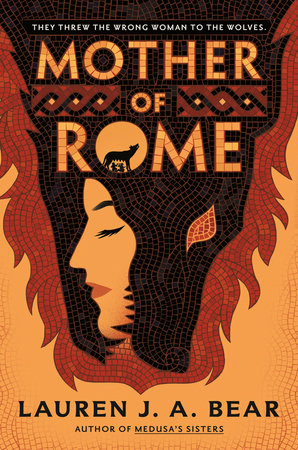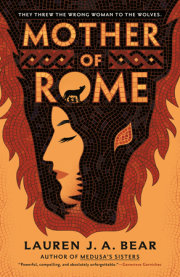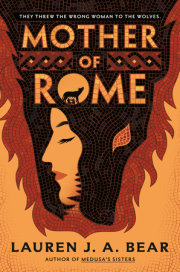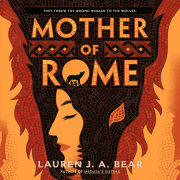PROLOGUE
THE GODS WHISPER a girl’s name; she curses them all.
On the night Rhea Silvia, Princess of Latium and favorite daughter, took her vows, five other women encircled her in the House of the Vestals, in its secret round room, enclosing the girl in a double loop of white robes and whiter stone. Rhea felt the heady mix of incense and energies— those of the women, the building, Vesta herself—some joined in accord and others at odds. Celebration, excitement, sisterhood. But also distrust and a bitterness bordering on enmity. Following the hallowed steps to the sacred hearth, she held all their empathies and judgments upon her young shoulders, obliging their ritual with the shallow reverence of an unwilling participant.
She kept her chin down but walked like a queen—even barefoot, even at her age. She had carried far greater weights than these.
When Rhea knelt before the fire, she imagined the unholy glee of her enemies, those who had killed and connived to bring her here, how they might revel in perverse satisfaction at Numitor’s lofty daughter brought so low. She heard their giddy hate across the city, in all the cities, and inside the minds of some women present.
No queendom for her! No wedding night! No wealthy prince! No jewels or servants or golden cups! Someone must pay the price for Numitor’s mistakes and losses, his wild queen.
Embrace this future, penitent!
Even the fire cackled.
But then Prisca, the eldest and ranking priestess, stepped forward, breaking the perfect symmetry of their circular order. “Hail, holy Vesta, living flame, center of our world!” she began. “You, holy Vesta of the Perpetual Fire, you stand on perpetual guard, your light protecting our city, our people, and banishing the darkness.”
Rhea’s fists clenched; what did these sheltered fools know of darkness? Any belief she’d once held in Vesta’s protection had long since shattered. The goddess was either dormant or indifferent. Vesta had not intervened in any of the tragedies that had befallen Rhea’s family. Vesta had done nothing to protect the land they’d ruled for sixteen centuries.
And the Silvian line, descended from Aeneas of Troy, had been pious enough, certainly. Had made the sacrifices and honored the flames only to be brought here: the end of the direct line. Fourteen generations of legend gelded.
But Rhea would not lay blame at Vesta’s altar.
Focus your hatred, she reminded herself.
Hone it. Keep it sharp and precise. Her subjugation wasn’t the goddess’s fault. Nor was it Prisca’s. Rhea was here, humbled on hands and knees in the ash, future burned, by the machinations of one man.
The taste of his disgusting kiss still lingered in her mouth. Bile rose in the back of her throat, and Rhea Silvia tasted rage.
She might choke on it, maybe suffocate.
This room was suddenly too small. And there were no windows, save for the smoke hole in the ceiling. And she knew she wasn’t supposed to look up. From now on, she must keep her eyes low, honor the hallowed.
Obey.
The ceremonial chanting commenced. Prisca called and the other four responded, surrounding Rhea. Their voices targeted her from every angle: voices ranging from alto to highest soprano, voices that ordinarily giggled and inflected, soared and speared, all homogenized by ritual.
A drone of wasps.
“Vesta, you dwell in our hearth so we may be one with your eternal power. Recast us in the shadow of your radiant blaze!”
“Hail the illuminating virgin.”
“Shine true in darkness—that of time and heart!”
“Hail the incorruptible virgin.”
One unmistakable voice cut through the rest, however, gloating with pointed piety. It was that bitch who had taken Rhea’s hair—her mother’s hair, as thick and brown as deep forest wood. The priestess Tavia had lopped it off with a kopis, large and slightly curved, shearing Rhea like an animal, nicking her scalp more often than not and leaving her head like a forgotten stump, a fallen log dotted with clumps of moss.
Tavia hummed while she worked, so Rhea knew her voice well. Heard it now, with traces of that sadistic melody, as Tavia repeated the high priestess’s call with a hint of singsong.
No, Rhea would not mourn her hair, not now, but she felt its loss, an empty shadow where it used to lie, down her back and almost to her elbows.
Oh yes, emptiness is its own weight, absence another burden.
Four members of the royal guard had escorted Rhea to the temple earlier that morning. Four. Apparently, her womb was that terrifying. After the soldiers left, the princess Rhea Silvia was taken apart, stripped, shorn, and reassembled as an initiate, ageless and shapeless. Covered in a white ascetic shift with a veil draped over her bare head. How her brothers would have laughed!
If she still had any brothers, that is.
“Vesta, wise and modest matron, accept this initiate, this offering, into your truth.”
“Hail the virgin, immaculate through immolation.”
Prisca, Virgo Maxima, Vestalis Maxima, sprinkled salt into the hungry flames. Rhea stared, letting her eyes go slack and unfocused, a practice that allowed her mind to escape from her body, to travel upward with the smoke, through that hole in the roof. In her imagination, she hovered above the temple and spied—even in the dark of night—her former hair hanging from a bough of the stone pine at its entrance, swaying slightly in the evening breeze, saying hello. Or maybe farewell?
Down below, the priestesses continued to chant.
Pounding, incessant. A war drum demanding her surrender.
To dream herself away was another act of rebellion, and Rhea Silvia was no stranger to the subversive. She had made that abundantly clear in her final hours of freedom. And these prayers were long. Boring. Blood and fire and salt in repetition. Instead, Rhea thought of the sky, of secrets shared with the stars. The scandalous euphoria of the night before.
Dream Rhea, spirit and ghost Rhea, departed the House of the Vestals and their temple. She flew toward the Regia, the royal complex built by Aeneas’s first son and the home where she was no longer welcome.
But in her mind Rhea could do whatever she wanted. Over the stone walls she bounded, to the windows where she could behold the wreckage: Her father’s bed. Her cousin in tears. Gratia and Gratia’s daughter, Zea, turning over her room. The new king on his throne.
And in her imagination Rhea made herself corporeal, leaping through this window and grabbing the Alban monarch by his throat. She held him down on the floor, thumbs pressed between the cords of his neck while his eyes bulged, and he sputtered and—
The splash of holy waters against Rhea’s face returned her to an equally gruesome present.
“Be cleansed! First by water, then by fire!”
Rhea Silvia ground her teeth, desperate to wipe the droplets from her face but knowing she could not. She must temper her emotions, in her countenance and in her actions—even if they saw her naked, even if they took her beauty or doused her in freezing water.
Her stoicism would be a tiny victory.
She could fantasize, but tonight was not destined for her revenge but to celebrate his: Amulius, uncle and usurper, his victory and vengeance upon them all.
“Vesta,” Prisca continued, setting down the ladle and pail, “we Latins survive by your favor and thrive within your love.”
Love. What was love to one betrayed and outmaneuvered by her own kin?
Love. To someone who’d known such heartbreak, such loss?
Love. To one abandoned and alone?
“Rhea Silvia, only daughter of Numitor and Jocasta, do you accept Vesta as your true mother, the Vestals as your sisters, our order as your home?”
“I accept.” And though Rhea lied, she could be proud, for her voice did not crack, did not shake.
“Do you accept our way of life? The standards we uphold to be worthy of this divine service? Do you sacrifice your years of fertility and transfer your maternal powers to Latium and the renewal of generations?”
“I accept.”
“And you will accept the consequences should you bring shame to yourself, or shame to your true mother, your new sisters, and our order?”
Rhea’s throat tightened. “I will. I accept.”
The priestess laid a bundle of spelt and wheat before her, and her voice was warm: “Then, child, kiss the beginnings of bread, which we transform in Vesta’s fire to sustain our bodies and our people. And let that seal your oath to the goddess and her Vestals.”
Rhea lowered her face to the ground and placed a chaste kiss on one fragrant sprig.
Prisca regarded the others. “Priestesses, do we accept this woman into our midst, to be our sixth? To complete our circle? To tend the city’s flames, prepare and cleanse the hearth, and observe the most inviolable rites?”
“We accept.”
“We accept.”
“We accept!”
“And we remember that to break these vows is to betray all of Latium.”
“Honor your vows!”
“Live your vows!”
“Protect Latium!”
An instrument rang from the periphery, some sort of brass peal, a concluding note. The end of a dirge. Prisca placed her wrinkled hands over Rhea’s inclined form in a final approbation. “Then let it be done.”
Rhea Silvia, princess turned priestess.
Yet unbeknownst to all, she had already been unmade in the forest, where she would be remade over and over again—but not yet, not tonight.
Tonight, she would be the virgin sacrifice.
But she was no virgin.
She remembered his hands upon her just the night before, in the woods, in the waters.
The women around her began to sing.
And beneath her veil, head bowed, Rhea Silvia thought of tomorrow and smiled, showing her teeth.
Copyright © 2025 by Lauren J. A. Bear. All rights reserved. No part of this excerpt may be reproduced or reprinted without permission in writing from the publisher.









